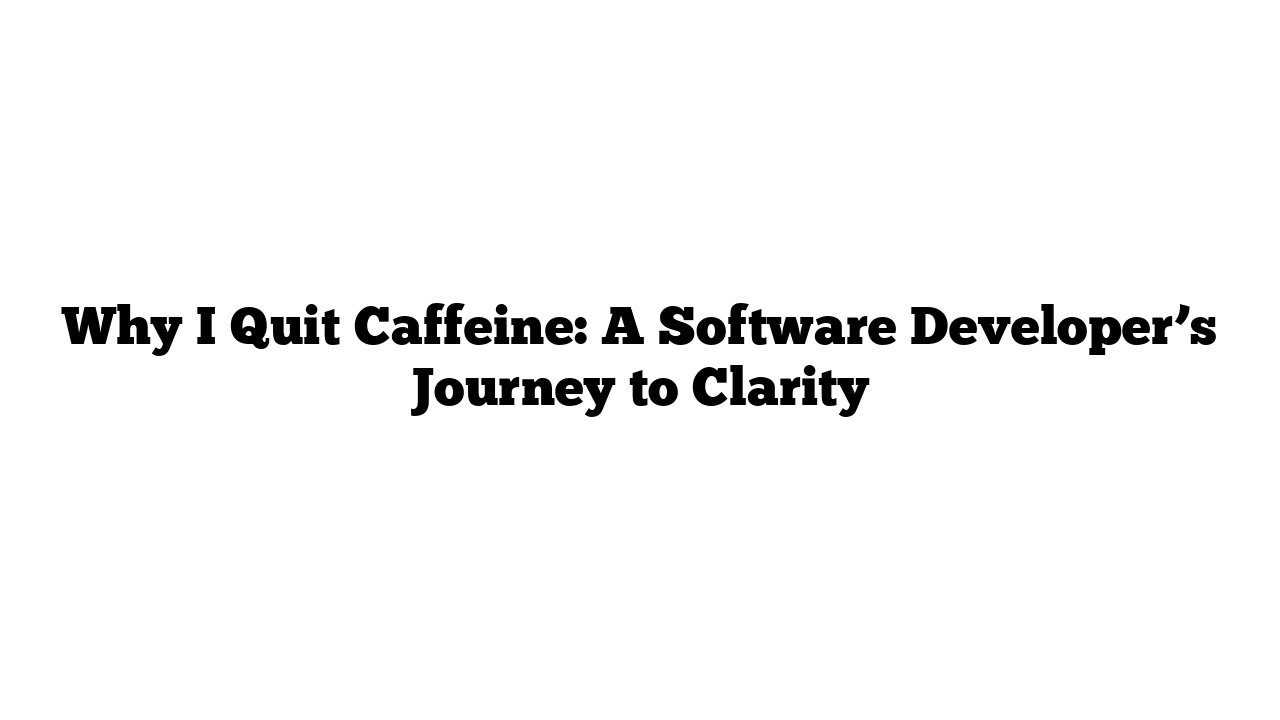As a doctor and former software developer, I understand the struggles that many face when trying to balance work demands and personal well-being. For years, I thought that caffeine was my secret weapon for staying productive during the long hours spent staring at a computer screen. In fact, a survey of over 70,000 developers showed that more than 80% relied on caffeine to fuel their coding sessions. But what if I told you that quitting caffeine could lead to unexpected benefits?
The Ritual of Coffee
For as long as I can remember, I have loved the ritual of drinking coffee. Since my teenage years, I’ve consumed about three cups a day. However, a year ago, I decided to quit caffeine altogether. The decision came after struggling with debilitating anxiety that felt like it was taking over my life. Grocery shopping became a challenge, and I often woke up at night, overwhelmed by panic.
I didn’t want to resort to medication immediately, so I explored natural remedies. That’s when I stumbled upon the decaf subreddit, where users shared their transformative experiences after quitting caffeine, describing it as a miracle cure for anxiety.
My Withdrawal Experience
Despite warnings from online communities, I decided to quit caffeine cold turkey. Going from three cups a day to none was no easy feat. The first few days brought headaches and irritability. However, my determination kept me going.
Around day five, things took a turn for the worse. The headaches faded, but I fell into a state of depression. I felt exhausted and unmotivated, struggling to get any work done. Yet, in a twist of fate, this lethargy replaced my anxiety. I eventually relapsed and returned to coffee, only to see my anxiety resurface days later.
Recognizing the need to quit for good, I opted for a slower approach by weaning off caffeine with green tea and half-caf coffee. Initially, my mood dipped, but it rebounded within two weeks. My energy levels, however, took longer to recover. I found myself sleeping well but still feeling drained during the day.
The Unexpected Benefits of Quitting Caffeine
After months of feeling low-energy, a surprising shift occurred. Gradually, my motivation returned, and my creativity surged. I regained my ability to work effectively, which was a welcome change after feeling unproductive for so long.
Decaf: A Healthier Morning Routine
One of the most notable changes post-caffeine was my mornings. Instead of craving coffee first thing, I woke up feeling alert and ready to tackle the day. This change can be attributed to improved sleep quality and a heightened awareness of my energy levels throughout the day.
If you’ve been following my work on Fire Ship, you may have noticed an increase in my video & Website output. I credit this newfound productivity partly to my decision to eliminate caffeine.
How Caffeine Affects the Brain
While I’m not a neurologist, I can share some insights on how caffeine impacts our bodies:
- Adenosine Receptor Blockage: Our neurons contain adenosine receptors, which accept a molecule called adenosine, responsible for making us feel tired. Caffeine blocks these receptors, making us feel more alert. However, once the caffeine wears off, fatigue returns, leading to potential crashes.
- Dopamine Reabsorption: Caffeine delays the reabsorption of dopamine, the neurotransmitter associated with pleasure. While this might temporarily lift your mood, it can lead to a cycle of dependency and poor mood later on.
- Increased Blood Pressure: Caffeine can elevate blood pressure, triggering a stress response in the body. This is particularly concerning for those who experience anxiety, as it can exacerbate symptoms.
The Bottom Line
Caffeine isn’t a miracle solution; it’s a collection of trade-offs that we need to weigh carefully. Some people argue that caffeine has health benefits, while others see it as detrimental. My experience has taught me that stepping away from caffeine has led to more significant advantages for my mental health.
As a doctor, I encourage you to evaluate your own caffeine consumption. Consider the possible effects on your body and mind. Whether you decide to quit caffeine or not, maintaining awareness of its impact is essential.
Want to learn more about health and wellness? Visit medicaltimes.io for more articles on living a healthier life!
For additional insights on caffeine’s effects and alternatives, you can check these sources:
Remember, your health is in your hands! Make informed choices and prioritize your well-being.
